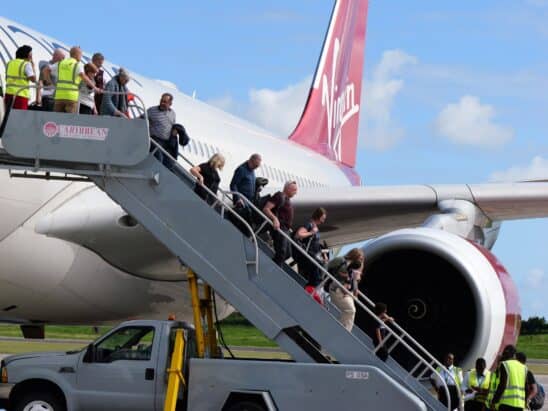
CLICK HERE TO JOIN OUR WHAT’S APP GROUP
By: Cdr. Bud Slabbaert
Passenger or tourism taxation is ‘swamp taxation’ because no one besides the tax receiver wants it, and it sucks.
Tourists may opt for visiting a different island destination that doesn’t have the taxes, yet does have the same sun, the beaches and the palm trees. Plus, the new discovery may even have more to offer and is worth a repeat visit. Competition in double degree.
The taxations were done in several locations, not just the Caribbean.
The tax was expected to raise a high amount of government earnings annually, but a commissioned report concluded that it costs the economy in general four times as much in lost revenue as it resulted in a steep decline in passenger traffic.
There are also indications that some “hotel visitors” converted into being cruise passengers by raising taxes on air tickets substantially. It may be less expensive to take a short cruise than the cost of a round- trip airline ticket for that short trip.
In essence it means that passengers would leave more money on the cruise ships benefiting the cruise operators, rather than spending it on shore at destinations.

If a destination or an airport in the Caribbean wishes to be an international hub, or even a regional hub, it is probably well advised to drop departure taxes and other passenger taxes.
ICAO is the International Civil Aviation Organization. a specialized agency of the United Nations.
It codifies the principles and techniques of international air navigation and fosters the planning and development of international air transport to ensure safe and orderly growth.
ICAO is distinct from other international air transport organizations, like the International Air Transport Association (IATA), a trade association representing airlines.
ICAO has clear policies on taxation and Member States are urged to apply ICAO policies on taxation in regulatory practices.
ICAO Assembly Resolutions have repeatedly urged Member States to follow the ICAO policies on taxation and not to impose taxes on the sale or use of international air transport.
Yet, Member States have not included in their ASA’s (Article on Taxation) a commitment to reduce or eliminate taxes on the sale and use of international air transport.
Caribbean Member States of ICAO are the sovereign countries: Antigua and Barbuda, Bahamas, Barbados, Cuba, Dominican Republic, Grenada, Haiti, Jamaica, Saint Kitts and Nevis, Saint Lucia, Saint Vincent and the Grenadines, Trinidad and Tobago.
The countries with overseas territories in the region are also ICAO members.
Already, in 2013, at their Worldwide Transport Conference, the ICAO issued the following text to be included in their Template Article on Taxation (TASA) :
“…. Each party shall undertake to reduce to the fullest practicable extent and make plans to eliminate as soon as its economic conditions permit all forms of taxation on the sale or use of international air transport, including such taxes for services which are not required for international civil aviation
or which may discriminate against it.”
According to ICAO a tax is a levy that is designed to raise national or local government revenues, which are generally not applied to civil aviation in their entirety or on a cost specific basis.
ICAO has also recognized that in the past decades there was a development of tourism taxes in some regions, in particular Latin America and the Caribbean. In many cases, revenues from the tourism taxes are not being reinvested in tourism development.
The main principles on taxation contained in ICAO policies are frequently adopted by international organizations in policy documents.
Some regional organizations and industry associations, such as the Airports Council International (ACI) and the International Air Transport Association (IATA), have also developed policies that are opposed to discriminatory and unfair government taxation on air transport.
The World Tourism Organization (UNWTO), while not opposed to taxes per se, as part of the overall fiscal responsibility of States, considers that travel taxes should be scrutinized objectively to avoid excessive burdens on travelers/companies with a view to reducing taxes that have a negative impact on travel and, hence on tourism development.
Despite these policies, the past decade has seen an unprecedented proliferation of taxes levied on air passenger tickets in the region.
This trend is again causing serious concerns and has a negative impact on the sustainable development of air transportation, which ultimately, negatively impacts the tourism industry, inter-island traffic, and the overall national economic development.
Caribbean governments are well advised to reconsider the current taxation or before making a decision on a new tax, an independent evaluation by qualified professionals acquainted with economics should be made on the impact of passenger taxation.
A ‘neat’ idea to get some extra money in the coffers, may turn out to be a monkeynomics.
What plays a crucial role and contributes significantly to an economy must not be hindered by ineffective government taxation which actually become counterproductive to tourism and the economy at large.
CLICK HERE TO JOIN OUR WHAT’S APP GROUP
CLICK HERE TO JOIN OUR WHAT’S APP GROUP
CLICK HERE TO JOIN OUR WHAT’S APP GROUP
CLICK HERE TO JOIN OUR WHAT’S APP GROUP
CLICK HERE TO JOIN OUR WHAT’S APP GROUP
CLICK HERE TO JOIN OUR WHAT’S APP GROUP
CLICK HERE TO JOIN OUR WHAT’S APP GROUP
CLICK HERE TO JOIN OUR WHAT’S APP GROUP
CLICK HERE TO JOIN OUR WHAT’S APP GROUP
CLICK HERE TO JOIN OUR WHAT’S APP GROUP
CLICK HERE TO JOIN OUR WHAT’S APP GROUP
CLICK HERE TO JOIN OUR WHAT’S APP GROUP
CLICK HERE TO JOIN OUR WHAT’S APP GROUP
Advertise with the mоѕt vіѕіtеd nеwѕ ѕіtе іn Antigua!
We offer fully customizable and flexible digital marketing packages.
Contact us at [email protected]
















Blah blah blah.
Arrivals for January 2025 exceeded January 2024.
Projections through March based on advanced bookings show an 8% increase.
Tourism is booming.
Also there are no proposed increases in travel related taxes in sources markets.
AI should ban these UPP s*** stirrers. This is getting tiresome. We can pretty much assume that anything we see being criticized in these lame editorials is actually doing well. That has been the reality in 99% of cases recently.
Again, UPP needs better writers. Perhaps get some younger people in the UPP propaganda department.
If tourism is the backbone of the economy, why make it more expensive for visitors?
If these taxes improve local infrastructure and services, they might be worth it—but will they?
More taxes might mean short-term gains, but the long-term risk of lower tourism could be devastating.
Instead of raising taxes, the government should focus on making tourism more attractive and competitive.
Comments are closed.